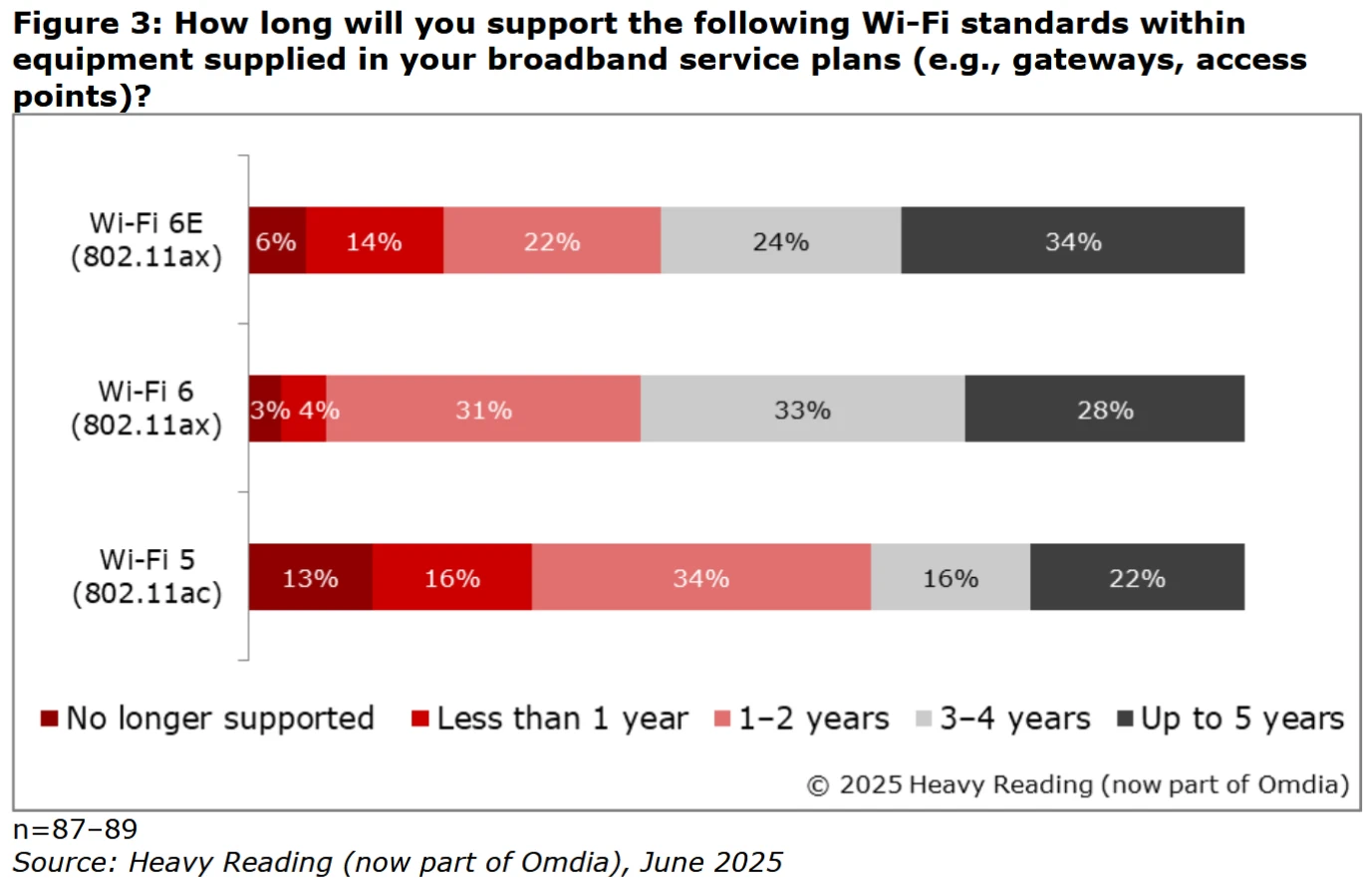New Survey Claims 50 Percent of Broadband ISPs to Adopt WiFi 7 Within 12 Months

A new survey of 90 global internet providers, which was conducted by Heavy Reading (Omdia), in collaboration with eero (Amazon) and Qualcomm Technologies, claims that more than 50% of ISPs have already deployed or expect to deploy WiFi 7 based service plans within 12 months. Part of this is to support the roll-out of multi-gigabit speed packages, said to be growing at 20.5% a year (CAGR).
In terms of what the ISPs currently support. A combined 63% of global service providers indicate Wi-Fi 5 is no longer supported or will only be for up to 2 years. Of all respondents, 16% will continue support for “3–4 years” and 22% “up to 5 years.” By comparison, 38% of respondents expect to support Wi-Fi 6 for up to 2 years.

Advertisement
Faster broadband speeds (61%) are said to remain the top driver for Wi-Fi upgrades to newer technologies like WiFi 7, with “Quality of experience/user experience” (48%) and “lower latency” (47%) following close behind. Not to mention that the most frequently reported customer concern related to ISP supplied Wi-Fi kit is “poor indoor coverage/dead zones” – 61% of respondents commonly recommend using a multi-device wireless architecture (based on a combined group recommending Wi-Fi extenders (33%) and mesh systems (28%)).
Additional Survey Highlights
➤ A combined group of 66% of respondents for business connectivity and 59% for consumer use consider Tri-band frequency support in Wi-Fi 7 (2.4GHz, 5GHz and 6GHz) to be extremely important or important for their connectivity offerings.
➤ 94% of ISPs currently offer, or plan to deploy, multi-link operation (MLO) – a key performance boosting feature of WiFi 7.
➤ Security and safety features (67%) are the top software priority for service providers when selecting Wi-Fi equipment. Device and real-time service optimization (54%), internet backup (29%), and the ability to sell value-added services, including third-party subscriptions (28%), follow behind.
➤ Automated troubleshooting (28%) and network optimisation (26%) are the top use cases for AI-based Wi-Fi network management. Predictive management (16%) and configuration management (15%) follow behind.
The catch in all of this is that Wi-Fi 7 is still more of a premium market feature, with most ISPs maintaining a mixed estate of Wi-Fi generations across their installed base. However, vendors are starting to introduce more affordable, entry-level products to make this technology more accessible, just as they always do.
The full Wi-Fi 7 Operator Survey can be accessed via the ISPA’s website (here), although we would have preferred to see the results for a survey that only focused on UK based broadband providers. Naturally eero also has a vested interest in plugging adoption of the latest router technologies.
Mark is a professional technology writer, IT consultant and computer engineer from Dorset (England), he also founded ISPreview in 1999 and enjoys analysing the latest telecoms and broadband developments. Find me on X (Twitter), Mastodon, Facebook, BlueSky, Threads.net and Linkedin.
« Openreach Expand Project Gigabit Broadband Builds in Devon and Somerset UK





















































There is an awful lot of people out there who still use older PCs/laptops which aren’t WiFi 6 compatible, let alone WiFi 7. Every day I have a conversation with some of them. It is not hyperbolic to suggest that a transition to an all-7 future will be more disruptive to society as a whole that the PSTN switch off is.
Even the overpriced eero 7 is backwards compatible, it would lose them a lot of sale if it was not, so just because the router is Wi-fi 7,, don’t mean it will not work with older stuff. The majority of smart home stuff still run on the 2.4Ghz band, I presume because it is more reliable and will go through walls that 5Ghz have problems with and the majority of smart home devices don’t need super-duper speed. A smart plug will just send a signal to say if it is on or off, even my doobell camera and blink cameras run on 2.4Ghz and they are fine.
So new Wi-Fi 7 routers will still support the older tech for a long time.
As for Wi-Fi 7 itself, There are two versions type of thing, cheaper routers that say they are Wi-Fi 7 seems to be on 5Ghz, while the more expensive ones use 6Ghz for Wi-Fi 7 from what I have been reading.
I am in no rush to update as long as my router keeps going, if I do update my router, then I may think about making one, just for the fun of it.
@AD47UK
Wifi6E routers use 6ghz band as well. I think this was when 6ghz was introduced.
It is quite hyperbolic really – WiFi7 routers work just fine with older kit. How is that disruptive in any way?
@Benjamin, Fair enough, I have not really looked into it, but I did have a search and you are correct. My TP-link is Wi-Fi 6
I have a growing number of devices that support it now. So it’ll soon be time to upgrade my UniFi access points to the Wi-Fi 7 versions, which are actually quite reasonably priced. And they have 2.5GBe POE ports, so next I can look at upgrading to a 2.5GBe switch, and onwards it goes! Admittedly all fairly pointless when our fibre connection is at 160/30Mbps, because that’s enough for now…
Higher PoE requirements can be a pain though!
I think this article is slightly misleading in that I doubt any of those 50% will offer Wifi7 upgrade to their current customers. This will only be a benefit their brand new sign-ups get. Unless of course you want to pay the ISP £100-£200 for an upgrade to your router that next to nobody would ever do.
Probably cheaper to buy a standalone access point especially for those that have a wired network in their houses.
I’d hope so personally but doubt it. Afaik there’s not been any mumblings on my current ISP VM on introducing it.
Honestly I wish they’d stop pushing the latest WiFi systems as it’s just pure marketing. WiFi 5 is perfectly adequate for 99% of applications as long as you get a decent signal. So much better to install multiple wireless access points with ethernet backhaul. Than trying to manage dead zones with mesh systems which hate the brick walls most British homes still have.
It’s not just marketing, the real world performance and reliability improvements are legit.
WiFi 6/7 is fine as an option but unacceptable as a minimum service. Obviously only a few devices have a need for that performance.
It is the higher frequency that causes the problems with the signal going through walls, that I think is why 2.4Ghz is used for the majority of smart home stuff. I tend to avoid Wi-Fi if I can, sometimes there is no choice, certainly in the smart home world. My computers, printers, both Nas, TV and my smart thermostat are all connected via Ethernet. It is a shame that my smart speakers can’t be connected by Ethernet, but there you go.
But yes, the majority of people don’t really need Wi-Fi 7, but the ISP will persuade them they do.
In recent years, WiFi numbers such as 6 and 7 have became more of a marketing thing. We’ve never heard of them advertising WiFi 5 many years ago.
The previous scheme used letter codes to differentiate. It confused people – so numbers were introduced. 802.11n, ac and ax were the previous standards.
That’s because it used to go by the catchy moniker of 802.11ac.
It is how they are recognised now, we used to have things like IEEE 802.11a, which is now Wi-Fi 2 and yes I did have to look it up as io could not remember the full name 🙂
Wi-Fi 7 is 802.11be, but what would you prefer to call it? At least they have done a better than what those did with USB